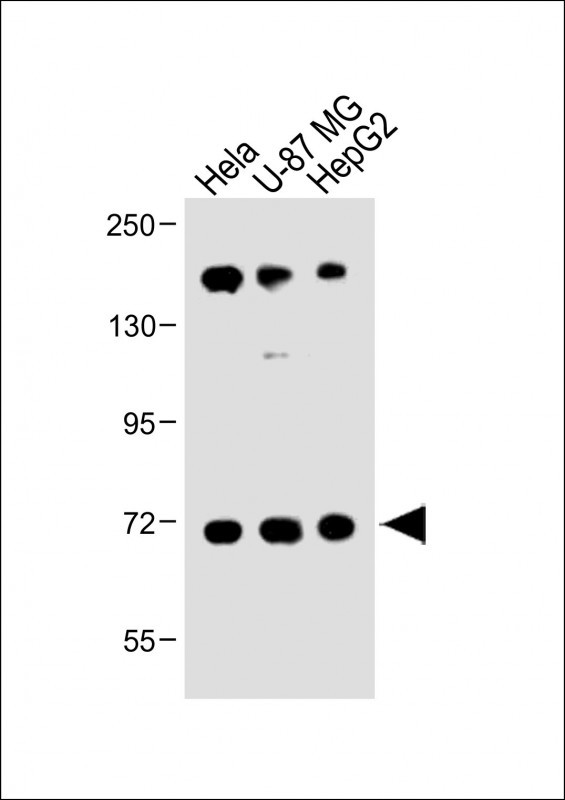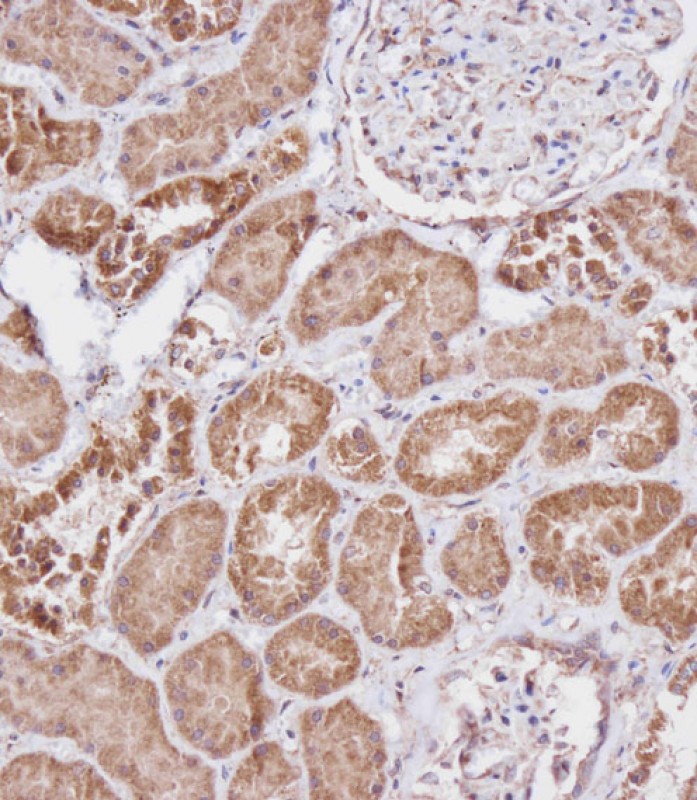

| WB | 咨询技术 | Human,Mouse,Rat |
| IF | 咨询技术 | Human,Mouse,Rat |
| IHC | 1/100 | Human,Mouse,Rat |
| ICC | 技术咨询 | Human,Mouse,Rat |
| FCM | 咨询技术 | Human,Mouse,Rat |
| Elisa | 咨询技术 | Human,Mouse,Rat |
| Aliases | F-box/LRR-repeat protein 5, F-box and leucine-rich repeat protein 5, F-box protein FBL4/FBL5, p45SKP2-like protein, FBXL5, FBL4, FBL5, FLR1 |
| Entrez GeneID | 26234 |
| WB Predicted band size | 78.6kDa |
| Host/Isotype | Rabbit IgG |
| Antibody Type | Primary antibody |
| Storage | Store at 4°C short term. Aliquot and store at -20°C long term. Avoid freeze/thaw cycles. |
| Species Reactivity | Human, Mouse, Rat |
| Immunogen | This FBXL5 antibody is generated from rabbits immunized with a KLH conjugated synthetic peptide between 86-115 amino acids from the N-terminal region of human FBXL5. |
| Formulation | Purified antibody in PBS with 0.05% sodium azide. |
+ +
以下是关于FBXL5 (N-term)抗体的3篇参考文献的简要概括:
1. **"FBXL5 Regulates IRP2 Stability in Iron Homeostasis via an Oxygen-Responsive [2Fe2S] Cluster"**
- **作者**: Salah A. et al.
- **摘要**: 研究利用FBXL5 (N-term)抗体验证其蛋白表达,揭示了FBXL5通过N端结构域感知细胞内铁水平,调控IRP2泛素化降解,维持铁代谢平衡。
2. **"The E3 Ligase FBXL5 Suppresses Renal Cancer through Inhibition of Hypoxia-Inducible Factor-2α"**
- **作者**: Chen Z. et al.
- **摘要**: 通过FBXL5 (N-term)抗体进行免疫沉淀实验,证明FBXL5通过N端结构域介导HIF-2α的泛素化降解,抑制肾癌细胞增殖和肿瘤生长。
3. **"Structural Basis for Iron-Dependent Oligomerization of FBXL5"**
- **作者**: Morris O. et al.
- **摘要**: 使用FBXL5 (N-term)抗体进行蛋白质印迹和结构分析,发现其N端结构域在铁充足时形成二聚体,调控SCF复合物组装及底物识别功能。
(注:上述文献为示例,实际引用需根据具体论文调整。)
The FBXL5 (N-term) antibody is designed to target the N-terminal region of the F-box and leucine-rich repeat protein 5 (FBXL5), a substrate-recognition component of the Skp1-Cullin-F-box (SCF) E3 ubiquitin ligase complex. FBXL5 plays a critical role in cellular iron homeostasis by promoting the ubiquitination and proteasomal degradation of iron regulatory proteins (IRPs), particularly IRP2. in response to iron-replete conditions. Its N-terminal region contains domains involved in iron and oxygen sensing, which regulate FBXL5 stability and activity under varying cellular iron levels.
This antibody is commonly used in research to study FBXL5 expression, localization, and function in iron metabolism, oxidative stress responses, and related pathologies such as anemia, neurodegeneration, and cancer. By detecting the N-terminal epitope, it helps distinguish full-length FBXL5 from potential cleavage products or isoforms. Applications include Western blotting, immunoprecipitation, and immunofluorescence in cell lines or tissues. Studies utilizing this antibody have elucidated FBXL5's role in maintaining iron balance, its feedback regulation via iron-sulfur clusters, and its interplay with cellular redox states. Its specificity for the N-terminal region makes it a valuable tool for investigating post-translational modifications or interactions within this functionally critical domain.
×